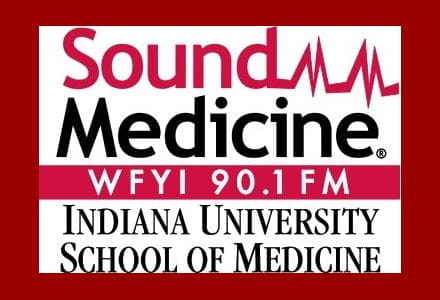INDIANAPOLIS — The award-winning “Sound Medicine” announces its program for June 30, featuring segments on changes to medical education, an update from the American College of Clinical Oncology’s annual meeting, and art classes for medical students.
Who will be able to buy Plan B over the counter? Plan B, commonly referred to as “the morning after pill,” is emergency contraception that can prevent pregnancy if taken within 72 hours of unprotected sex. Last week, the Food and Drug Administration approved Plan B Onestep for over-the-counter sale with no age restrictions. Plan B Onestep previously required a prescription or parental consent for those younger than 17; research by the FDA proved girls younger than 16 understand how to use it safely and effectively. Dr. Carroll is an associate professor of pediatrics and the associate director of Children’s Health Services Research at the Indiana School of Medicine. He is also the director of the Center for Health Policy and Professionalism Research.
Doc Chat: Can vinegar detect cervical cancer? “Sound Medicine” regular Kathy Miller, M.D., recently attended the American College of Clinical Oncology’s annual meeting and talks about some unique presentations with host Barbara Lewis. According to Dr. Miller, cervical cancer is the No. 1 cause of cancer death for women in India, where there is no access to diagnostic tests used in developed countries. A 15-year study of 150,000 women in the slums of Mumbai, India, showed that regular screenings for cervical cancer by public health personnel using a simple process with vinegar decreased cervical cancer deaths by 31 percent; personnel were trained over the course of a few weeks in how to administer vinegar to detect cervical cancer. Dr. Miller is the co-leader of the breast cancer program at the IU Simon Cancer Center.
How will one new medical school convince more students to enter primary care? As the health care system is preparing for more patients in need of primary care physicians, medical schools are rising to meet the challenge. Netter Medical School at Quinnipiac University in Connecticut is opening in the fall, one of 16 new medical schools that focus on a primary care curriculum. According to Bruce Koeppen, M.D., founding dean of the Netter Medical School, the curriculum will prepare students to pursue any specialty but will also emphasize primary care through community involvement and mentorship with faculty members. Dr. Koeppen’s goal is to have 50 percent of graduates pursue careers in primary care; the university is working to develop a fellowship program that forgives medical school tuition if the student goes into primary care.
Doc Chat: Why should medical schools revise their curricula to address sex and gender differences? A recent article in the Journal of Women’s Health argues that medical schools need to incorporate the role of sex and gender in determining appropriate patient treatments in their curricula. According to “Sound Medicine” healthy living expert Theresa Rohr Kirchgraber, M.D., dementia, coronary artery disease and cancer affect men and women differently; she agrees with the journal’s position that an increase in gender education for medical students and current medical professionals will decrease mortality and morbidity. Dr. Rohr-Kirchgraber is an associate professor of clinical medicine and pediatrics at the Indiana University School of Medicine. She sees patients at Riley Hospital for Children at IU Health and Wishard Hospital in Indianapolis.
Why are doctors taking art classes? Tom Weinzerl, director of the Office of Visual Media at the Indiana University School of Medicine, created a course that teaches art to residents and medical students. According to Weinzerl , learning to draw and sculpt human features and organs is important because it helps medical students and residents understand the relationship of the components of the body. This course not only benefits those interested in plastic surgery; aspiring surgeons in many specialties and dermatology have also benefitted from the class.
Drawing with Doctors: “Sound Medicine” reporter Sandy Robb recently attended an art class with several medical residents at the Indianapolis Art Center. The classes are the brainchild of Dr. Christopher Jones of My Plastic Surgery Group. According to Rob Paul, M.D., an Indiana University plastic surgery resident, taking art classes has helped him understand negative space in addressing the fine details in facial structures. Another medical resident, Christine Ueno, M.D., has noticed she needs to work more on proportions and translating two-dimensional to three-dimensional objects.
“Sound Medicine” covers controversial ethics topics, breakthrough research studies and the day-to-day application of recent advancements in medicine. It’s also available via podcast and Stitcher Radio for mobile phones and iPads and posts updates on Facebook and Twitter.
Co-produced by the IU School of Medicine and WFYI Public Radio (90.1 FM) and underwritten in part by Indiana University-Purdue University Indianapolis, Sound Medicine airs on the following Indiana public radio stations: WBSB (Anderson, 89.5 FM), WFIU (Bloomington, 103.7 FM; Columbus, 100.7 FM; Kokomo, 106.1 FM; Terre Haute, 95.1 FM), WNDY (Crawfordsville, 91.3 FM), WVPE (Elkhart/South Bend, 88.1 FM), WNIN (Evansville, 88.3 FM), WBOI (Fort Wayne, 89.1 FM), WFCI (Franklin, 89.5 FM), WBSH (Hagerstown/New Castle, 91.1 FM), WFYI (Indianapolis), WBSW (Marion, 90.9 FM), WBST (Muncie, 92.1 FM), WBSJ (Portland, 91.7 FM), WLPR (Lake County, 89.1 FM) and WBAA (West Lafayette, 101.3 FM).
“Sound Medicine” is also broadcast on these public radio stations across the country: KSKA (Anchorage, Alaska), KTNA (Talkeetna, Alaska), KUHB (Pribilof Islands, Alaska), KUAF (Fayetteville and Fort Smith, Ark.), KIDE (Hoopa Valley, Calif.), KRCC (Colorado Springs, Colo.), KEDM (Monroe, La.), WCMU (Mount Pleasant, Mich.), KMHA (Four Bears, N.D.), WYSU (Youngstown, Ohio), KPOV (Bend, Ore.) and KEOS (College Station, Texas).
Please check local listings for broadcast dates and times.




